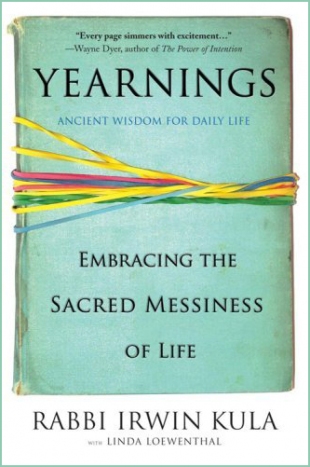"The origin of the Hebrew word for blessing says so much. If you change one vowel of the Hebrew word bracha you have the word for 'pool of water.' Bracha also comes from the same root for the word 'bent knee.' The word 'blessing' was first used by a desert people. Imagine the experience of coming across a reservoir of water in the middle of a barren wilderness and then kneeling before that pool to drink fully. The ancient Israelites saw water as a blessing, and blessing as a spring of happiness. So the word for blessing was born of a sensual yearning, out of thirst and the wonder that comes from quenching it. In other words, the pool is a symbol of life itself, and blessing connects us to the energy current that sustains us.
"In Hebrew, the blessings are called 'blessings of enjoyment.' Pleasure is God manifested, or, as Buddhists believe, form is formlessness made material. Blessings are a way of contextualizing pleasure, a reminder of the source of everything. Abraham Joshua Heschel wrote beautifully about this: 'When we drink a glass of water, we remind ourselves of the eternal mystery of creation, "Blessed are You . . . by whose word all things came into being," whether a trivial act or a supreme miracle. When we wish to eat bread or fruit, to enjoy a pleasant fragrance or a cup of wine . . . on noticing trees when they blossom, on meeting a sage in Torah or in secular learning, we are taught to evoke His great name and our awareness of Him . . . This is one of the goals of the Jewish way of living; to feel the hidden love and wisdom in all things.'
"I feel so fortunate to have grown up in a tradition that continually raised my pleasure consciousness. The first time I remember being aware of what a gift I'd been given was as a teenager when I put on a new pair of jeans. I remember relishing the stiffness and snugness, anticipating all the mornings I would put them on, how each time they'd be a little more faded, fit a little better. That morning, my mother had taken my brothers and me for our semiannual shopping spree. These expeditions always took place around the seasonal festivals of Passover in the spring and Succot in the fall. They were literally a ritual. Of course, there was the practical aspect: We needed clothes for the winter and then the summer months. But no less important was the fact that we were anticipating these two important holidays by celebrating the sensual: ushering in the spiritually new with sensual delight and pleasure. That spring afternoon before I put those jeans on I said a simple blessing, which is made with any new experience. After I put them on I remember feeling a rush of contentment as I glanced in the mirror at my jeans and did a little dance.
"Blessings are said before; not after. The blessing gives us a hit of gratitude even before we indulge. We feel thankful not only after having the great experience, but as a way to enhance that experience as we're having it. We surface our desire so that we feel it fully and therefore bring intention to the act of satisfying it. The blessing I said over those jeans was, 'Praised are you who clothes the naked.' When we really can experience the yearning to be clothed; when we can appreciate the feeling of being protected from the elements, or covered by a soft or silky fabric; we are so much more satiated than we would be after a frenetic day shopping at the mall. Clothing ourselves can then be a metaphor for clothing the world. One practice I learned growing up is to give away one piece of clothing whenever we buy a new one. When we feel blessed, we are more likely to become a blessing to the world."
